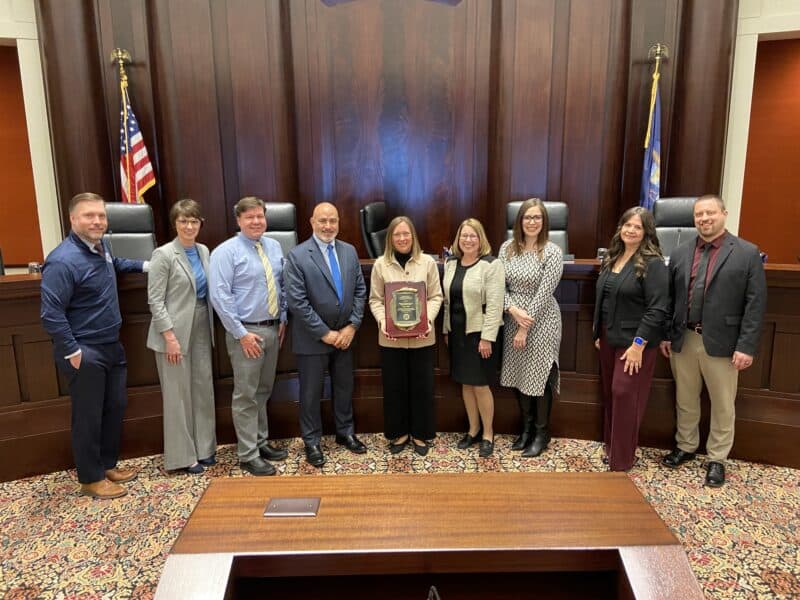Judge: Goal is to reduce, if not eliminate, delinquency; and rehab offenders
Originally published in the Midland Daily News.
A recent article in the Detroit Free Press was highly critical of Michigan’s juvenile justice system. It was based on a study by an investigative agency, ProPublica, that claimed the system is archaic and that judges are locking up children for many noncriminal offenses including for skipping school. These are serious charges and require a thoughtful response for the citizens of Midland County, as this is certainly not the case here in Midland County.
The overarching philosophy of the Midland County Probate and Family Court is to reduce, if not eliminate, delinquency as well as to rehabilitate offenders so that they will eventually flourish and thrive as contributing adult members of society. This requires the implementation of three broad strategies that this court has adopted over the past two decades to move this objective forward. The strategies in brief are to:
- Collaborate with community organizations and agencies in a concerted and integrated fashion to offer evidence-based interventions and programs to prevent risk-taking behaviors among adolescents.
- Provide evidence-based options and treatment programs to rehabilitate offenders while maintaining accountability for their offenses.
- Utilize a risk-based flexible charge disposition approach, where appropriate, to minimize permanent criminal records that cannot be expunged for those who have been successfully rehabilitated.
Outcomes
Fortunately, in Midland County, we have the advantage of extensive long-term data. These strategies have been incredibly successful in decreasing delinquency and other risk-taking behaviors in Midland County. Some of the stunning successes include:
- Delinquency has been reduced by nearly 90% over the past two decades (from 1,190 in 1998 to 154 violations and adjudications in 2019 and 70% since 2005).
- There has been an 89% decline in drug offenses with a corresponding 94% reduction in alcohol use in the past 17 years.
- The two-year recidivism rate for community youth with substance use disorders who have completed Midland Kids First’s Recovering Youth Futures program is approximately 15%, well below national averages of about 45%.
- In collaboration with Midland Kids First and Midland-area health and behavioral health providers, the court is also embarking on a proven child maltreatment prevention program developed by the University of Maryland called “Safe Environment for Every Kid” (SEEK). This promises to decrease adverse childhood experiences thereby reducing the chances of future risk-taking behaviors among our children.
- In addition, because of these reductions in delinquency in the county, the court has saved an estimated $14 million for out-of-community placements since 2004 and $5 million in cumulative operational costs.
Community Based Services
These very desirable outcomes have been a direct result of a two-pronged approach emphasizing both the prevention and treatment of risk-taking behaviors utilizing community-based “best practices.” On the prevention front, multiple youth-serving agencies in the community have rallied around the concept of Developmental Assets; 40 positive character traits that all youth should have to be successful.
This model, first introduced to the community by The Legacy Center for Community Success in 2005, emphasizes Positive Peers as the principal protective factor in keeping teens out of trouble. Programs that promote Positive Peers include participation in creative, faith-based, and organized youth activities. Of 24 risk-taking behaviors, Midland County youth with the full complement of assets participate in an average of 0.5 of these activities. This has been a formidable force for the stunning declines in delinquency.
Truancy reduction and school to prison pipeline
Another powerful contributing factor is the reduction in truancy. Midland County schools and the Midland County Department of Health and Human Services have been leaders in collaborating with the court with a constructive approach initially called the Community Schools program to reduce truancy. The program is now known as Pathway to Potential. Contrary to ProPublica’s claim as reported in the Free Press, Midland County does not lock up children for skipping school but instead provides this enlightened approach to reduce truancy. The program calls for understanding the reasons for students’ chronic absences and then assisting them and their families to overcome these barriers by connecting them with existing community resources. This is done outside the court system with the participation and support of all of our schools in Midland County.
Risk assessments
The second element in the strategy is to provide interventions to treat the causes of delinquent behaviors and to ultimately prevent future offenses. The first step is to conduct a risk-assessment of youth charged with an offense with the commonly used “Youth Assessment and Screening Instrument” (YASI).
We have used risk assessments for over 13 years, starting in 2007. YASI is a tool that has been extensively validated to determine the risk a youth poses at the time of the assessment. Using the YASI results, the court works with both the prosecuting and the youth’s attorneys to determine whether and to what extent the initial charges can be appropriately reduced. This is done with a process that still maintains accountability for the offense, will not have the charge remain on the youth’s permanent record, and provides a pathway for the implementation of restorative rather than punitive services for both the youth and the family.
In 2019, for example, of the 96 charges brought before the court, 21 offenses or 22% were reduced to either misdemeanors or status offenses and 13 charges were dismissed. Our experience is that this approach significantly increases the chances for rehabilitation and success in the youth’s adult life.
Other programs that treat offenders and their families include:
- Midland Mentors, an intensive mentoring program for at-risk youth by extensively trained volunteer mentors.
- Strengthening Families, an evidence-based program that provides strategies for parents and youth in the system on how to work together to provide positive outcomes for both.
- Multisystemic Therapy (MST), an evidence-based intensive family and community-based treatment for serious juvenile offenders and those with substance abuse issues and their families. MST-PSB (Problem Sexual Behaviors) has also been used with considerable success in treating problem sexual behaviors among youth.
- We have extensive evidence-based and evidence-influenced mental and behavioral health services that are provided court wards by community agencies including MidMichigan Health, Community Mental Health for Central Michigan, Partners in Change, and J & A Counseling and Evaluation. We have 19 evidence-based programs that are used extensively and are targeted specifically on the needs and risks of the individual youth.
Progress because of collaboration
Midland County Probate and Family Court promotes restorative rather than punitive justice practices and programs for our youth and is making stunning progress towards eliminating the “School to Prison Pipeline.”
This is a direct result of a concerted and integrated collaborative effort between the Probate and Family Court and multiple community agencies including government at several levels, law enforcement, the schools, generously supportive local foundations, numerous non-profits and human services agencies, and corporations who have made physical and mental health, family, and behavioral services available to our youth and families.
These efforts have helped to reduce delinquent and related risk-taking behaviors, to facilitate rehabilitation while assuring and safeguarding accountability for offenses committed, and ultimately, to improve the probability of successful lives where all youth and families flourish and thrive.
The ProPublica article can be accessed at https://www.freep.com/story/news/local/michigan/2020/12/22/michigan-juvenile-justice-system-archaic/4008880001/
Dorene S. Allen is the presiding judge for the Midland County Probate And Juvenile Court. She received her undergraduate degree from the University of Michigan and her Juris Doctor from Michigan State University. She was first elected to the Midland County Probate and Juvenile Court in 2000 and subsequently was reelected in 2006, 2012, and 2018.




